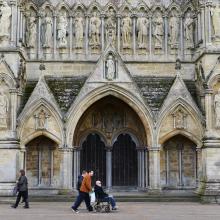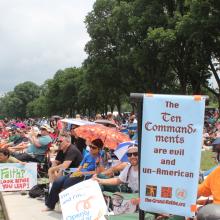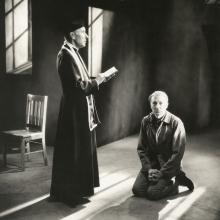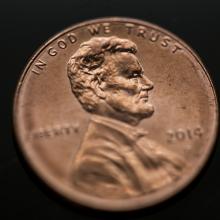separation of church and state
EVEN APART FROM the fabricated battles of the culture wars, seeking the proper balance between church and state in U.S. public life has always been a contentious matter. The Constitution prohibits governmental establishment of any religion and protects the free exercise of all religious belief. But, as Da’Shawn Mosley explains in this issue, when it comes to people of faith in public service, not all religions are created equal.
Since the Puritans’ “city upon a hill” and before, Christian imagery and beliefs have been cornerstones of American self-understanding, and the so-called “separation” of church and state has been arguably more honored in the breach, as evidenced by the nearly unbroken line of Christian presidents. Almost all Americans—including, it is hoped, most Christians—would strongly oppose a religious litmus test for public office. But the real challenge, as Mosley points out, seems to be whether those beliefs hold true when Muslims join citizens of other faiths and no faith in seeking the keys to the city on the hill.
As far back as the early 19th century, Catholic students and other religious groups were sometimes whipped, beaten, and worse, for not participating in prayer and Bible reading in the common schools, a predecessor to the public schools.
IN JUNE, THE U.S. SUPREME COURT ruled in favor of a Lutheran church in Missouri seeking state funding to replace the gravel yard of its playground with a softer surface made of recycled tires. But was it a victory for religious freedom or a violation of the principles separating church and state? Sojourners associate editor Betsy Shirley interviewed Charles C. Haynes, founding director of the Religious Freedom Center of the Newseum Institute, to help sort it all out.
Sojourners: Let’s start with the basics: Where does the idea of “separation of church and state” come from?
Charles Haynes: The Establishment Clause—or, more accurately, the “no establishment clause”—is the part of the First Amendment that separates church from state, preventing the entanglement of religion and government that has been the source of repression and conflict for much of human history. But it also protects the right of religious groups and individuals to participate fully in the public square of America.
Too often, Parker said, teachers have placed Christian crosses and Bible verses on school walls, prayed aloud in classrooms and said things like, “The answer to all your big questions is God.”
PURPLE IS THE liturgical color for Lent. “Purple” is also the political identity of America’s houses of worship. We are a mixture of Republicans, Democrats, and independents who come together for worship, fellowship, and service. No political party owns religious truth.
In 2017, some in Washington, D.C., made a concerted effort to undermine churches’ congregational political mix through the repeal of the Johnson Amendment, a provision in the tax code since 1954 that protects the independence and integrity of not-for-profit organizations by prohibiting them from endorsing or opposing candidates for public office.
The Johnson Amendment does not specifically target churches; it applies equally to all 501(c)(3) organizations, religious and secular. Under the current tax code, churches are assumed to be 501(c)(3) organizations (c3s) but can opt for another tax-exempt status. Most churches remain c3s because in addition to being tax exempt, congregants’ tithes and offerings are tax deductible. Despite some hysterical claims, churches and charitable organizations can address any issue—no matter how controversial or unpopular—under the current tax code. The line is drawn, however, at c3 organizations telling people who to vote for or against.
During the fall debate on the largest change to the U.S. tax code in 30 years, the House version of the tax bill would have effectively repealed the Johnson Amendment. The Senate version never included such language, nor did the final version of the bill that became law.
We might have seen the end of this longstanding tax provision if not for the outcry from nonprofits, foundations, and people of faith. Can you imagine? Candidate commercials played during worship services. Candidate flyers included in every bag of food given out by the local food pantry.
The bill cuts funding for the IRS by $149 million from fiscal year 2017, and the IRS wouldn’t be able to use any funding it receives to investigate a church for making such endorsements, according to the bill. It would have to get the consent of the IRS commissioner, who then would report to Congress on the investigation.
After a quarter-century, the Rev. Barry Lynn is retiring as head of Americans United for Separation of Church and State.
In court, in congressional hearings, and on cable television, Lynn has led the fight against school-sponsored prayer, religious symbols on public property, and any law that allows government to privilege people of faith.
The case, which examines the limits of religious freedom under the U.S. Constitution, is one of the most important before the court in its current term. It also marks the biggest test to date for the court's newest justice, President Donald Trump's appointee Neil Gorsuch.
The Trump administration’s hard-line stance on undocumented immigrants is polarizing: People have responded with either “throw the bums out” or “have a heart.” But the question of whether faith communities can legally offer the undocumented physical sanctuary — sheltering them in churches, synagogues, and mosques to keep them from immigration authorities — is not so cut and dry.
For some, the choice is not clear. Clinton-Kaine may be the more personally religious ticket, but Trump-Pence is more cozy with the religious right, aka the evil empire among atheists. Then there’s Green Party candidate Jill Stein, who has no chance of victory, but is the only candidate who reached out to nonbelievers and asked for their vote.
So what’s an atheist to do?

Image via 1000 Words / Shutterstock.com
In late 1945, after the end of World War II, Kurt Neumann began digging in his garden.
During the previous eight years, under the brown soil, a bunch of documents and photos had lain in repose. He scrubbed off the dirt and unspooled the documents from the oil paper preserving wrapped to protect them. He had survived the war and so had the founding papers of the city’s anti-religion, secularist movement.

Image via Adelle M. Banks / RNS
Atheists and other freethinkers gathered on the National Mall for their second “Reason Rally” in fewer numbers than organizers had hoped but with evidence of growing political acceptance.
Wearing T-shirts and carrying signs rejecting religion and supporting science, thousands cheered speeches from politicians, scientists, and secular leaders about church-state separation and freedom from religion.

Image via Everett Collection / Shutterstock.com
Judge William Mallory enjoys handing out creative sentences from his bench over at the Hamilton County Courthouse.
But the one he meted out in his Municipal Court room Wednesday wasn’t even his idea.
And boy, oh boy did he like it.

Tennessee state capitol. Image via jiawangkun / Shutterstock.com
If Haslam signs the bill, the Bible would join a list of state symbols such as the raccoon as the state’s wild animal, the Eastern box turtle as the state reptile, the square dance as the state folk dance, milk as the official state beverage, and the Barrett M82 sniper rifle as the official state rifle, which lawmakers approved earlier in the session.
The state’s Senate Judiciary Committee on March 29 gave the green light to a bill that would make the Bible the official book of Tennessee, The Tennessean reports.

Image via Sally Morrow/RNS
A California atheist who once argued against the Pledge of Allegiance before the Supreme Court has launched a federal legal challenge to the phrase “In God We Trust” on American currency. Michael Newdow , 62, a Sacramento-based emergency-room doctor, filed a federal lawsuit seeking to strip reference to God from paper money and coins in an Ohio court earlier this month. Newdow claims the motto is a violation of his religious freedom.

Image via Joseph Sohm/Shutterstock.com
Only seven contenders will be on the main stage for Fox Business News’ broadcast of the sixth GOP 2016 presidential debate Jan. 14 — almost all well-known for taking strong stands on faith in hopes for a boost from devoted viewers. The December debate was the third-most-watched one in debate tracking history, according to CNN. The theme of this week’s debate will be economic policy, with managing editor for business news Neil Cavuto and global markets editor Maria Bartiromo asking questions.
Pope Francis is not a liberal or conservative. He transcends pedestrian labels that drive wedges in American society.
So perhaps it trivializes spirituality and religion to keep political score on the pope's visit. But it also might lend instruction and context to some of our raging debates.
So here's how I score it: In the current American political context, Pope Francis was mostly, but not exclusively, left-leaning in his address to Congress on Thursday.

Wake Forest Divinity School professor Rev. James Dunn. Photo via Ken Bennett / Wake Forest University School of Divinity / RNS
The Rev. James M. Dunn, a religious liberty advocate who worked the corridors of Washington power for two decades to defend the separation of church and state, died on July 4.
He was 83, and died of a heart attack at his Winston-Salem, N.C., home, said Cherilyn Crowe, spokeswoman for the Baptist Joint Committee for Religious Liberty.
After retiring from leading the committee in 1999, Dunn taught at Wake Forest University’s divinity school in Winston-Salem, serving as a professor of Christianity and public policy until 2014.
The Internal Revenue Service said it will monitor churches and other houses of worship for electioneering in a settlement reached with an atheist group.
The settlement was reached Friday in federal court in Madison, Wis., where the initial lawsuit was filed in 2012 by the Freedom from Religion Foundation, a Wisconsin-based atheist advocacy group that claims 20,000 members nationwide.
The suit alleged the IRS routinely ignored complaints by the FFRF and others about churches promoting political candidates, issues or proposed legislation. As part of their tax-exempt status, churches and other religious groups are prohibited from engaging in partisan political activity.












